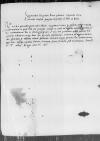List #6351
Sigismund I Jagiellon do Ioannes DANTISCUS & Tiedemann GIESECracow (Kraków), 1546-03-22
| odebrano Heilsberg (Lidzbark Warmiński), 1546-04-05 Rękopiśmienne podstawy źródłowe:
| ||||
Tekst + aparat krytyczny + komentarz Zwykły tekst Tekst + komentarz Tekst + aparat krytyczny
Reverendis in Christo Patribus, dominis
 BCz, 1601, p. 509
BCz, 1601, p. 509 Reverendi in Christo Patres, domini, sincere nobis dilecti.
Accepimus litteras Paternitatum Vestrarum, quibus causam
Quas bene valere cupimus.
Dat(ae) or Dat(um)⌈Dat(ae)Dat(ae) or Dat(um)⌉

